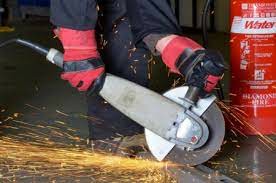


 349,500 Offered Certificates
349,500 Offered Certificates
 24/7 Online Training
24/7 Online Training
 Money Back Guarantee
Money Back Guarantee
 Fully Accredited Courses
Fully Accredited Courses

Created at: 22-02-2025 19:58
Abrasive wheels are indispensable tools in various industries, from construction to manufacturing. Known for their ability to grind, cut, and polish materials, these wheels come with significant risks if not handled correctly. This guide will delve into the definition of abrasive wheels, the safety risks associated with their use, and the crucial training necessary for safe operations in cities like Dublin, Cork, Galway, Limerick, Waterford, and beyond.
So, what are abrasive wheels? These circular discs are made from abrasive materials such as aluminum oxide, silicon carbide, or diamond. They are designed to be used on handheld or stationary machines for tasks such as cutting, shaping, or finishing materials like metal and stone.
While abrasive wheels are useful, abrasive wheels safety risks are prevalent, including:
Proper training is essential to mitigate risks associated with abrasive wheels. Organizations in Dublin, Cork, Galway, Limerick, and Waterford must ensure their workers undergo rigorous training to:
In Ireland, stringent regulations govern the use of abrasive wheels to protect workers. Employers must:
To prevent accidents when using abrasive wheels, follow these best practices:
For those seeking professional development, numerous options exist for abrasive wheels training Cork, abrasive wheels certification Galway, and more. Enroll in an abrasive wheels online course or attend an in-person session.
To explore our extensive range of training services, visit here or contact us at [email protected].
In conclusion, understanding abrasive wheels and adhering to strict safety protocols are integral to protecting workers in diverse jobs across Ireland. With the right training and safety measures in place, businesses can not only ensure compliance but also create a safer workplace for everyone involved.